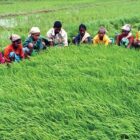A series of misadventures over trifurcation and a religious-political agenda followed by central and state governments have converted Punjab into a economic basket case
From being India’s breadbasket, Punjab has become a basket-case economy. Endowed with ample water and good soil, Punjab’s happy, progressive people had a dream that came alive before turning into a nightmare. Punjab’s decline started with its trifurcation. In its bid to establish a separate identity, the political establishment obsessed over a religious-political agenda steered the state into the dark days of terrorism. Haryana, once considered the backwaters of joint Punjab, focused on an economic agenda and is today far ahead of Punjab in terms of per capita income.
The centre’s policies aimed at increasing food production to ensure an adequate supply of grain, coupled with export restrictions, have taken a toll. The expected progression of Punjab from agricultural economy to industrial powerhouse to becoming the service-sector leader never took place. Food processing, essential for agricultural prosperity, never took off, for instance, Punjab exports wheat but imports wheat flour. As long as off-farm jobs do not get created, discontent will rise in the state. Over the last decade, Punjab has had more than its fair share in the union cabinet but that has not contributed to its progress.
It is not right to blame the Green Revolution for the mess for there is much more to it. Starved of state government funds, the Punjab Agriculture University (PAU) has witnessed decreasing faculty strength and new research has all but stopped in the last decade. The state imposes high taxes on the purchase of foodgrain by the Food Corporation of India and even if it shared five per cent of the collections with the PAU, it would help its revival. Instead, political expediency takes precedence over vision and foresight that would disincentivise the monoculture of wheat and rice.
Punjab also has a suffocating 6,00,000+ tractors. Tractor ownership is viable only when the vehicle is operated for more than 900 hours per year. Farm use of tractors is around half those hours. As a result, once a farmer buys a tractor, he works for the bank for life to repay the loan and interest. Had the government supported three-year interest-free loans to service-hiring entities, they could buy better farm machinery that could empower farmers to access mechanisation without taking on any financial burden. This could raise crop yields by 20 per cent.
The next grief is over exploitation of groundwater because of the free power provided to farmers. This has resulted in the water table falling to dangerously low levels. The cost of drawing water from greater depths increased indebtedness among farmers. Augmenting the inadequate free power with diesel engines works out to be more expensive. If the leadership showed political will, farmers would happily pay Re 1 per unit for consistent and quality water supply.
Urea is another sore point, sold at one-fourth the price of table salt today, prompting excessive use of cheap urea. This destroys the soil and leads to more plant vegetative growth. An explosion of insect and pest populations ensues. Indiscriminate, unregulated sale of pesticides and spurious products enhances the ecological disaster. A 10-per cent annual reduction in pesticide-use is critical for the state. Even increasing urea price and simultaneously subsidising DAP could be a quick interim measure, driving more balanced fertiliser usage.
The nexus of politicians, bureaucrats and powerful agro-industrial conglomerates has, however, sent Punjab into a downward spiral with distressed young farmers committing suicide. At the time of the infamous farm loan waiver, Punjab contributed nearly half the grain to the Central pool but received less than two per cent of funds waiver funds. This is not because farmers were not defaulting on debt but because of the way banks were window dressing accounts. The robust co-operative banks and societies movement has been destroyed by political interference.
Strangely, Punjab farmers are now burdened with the cost of fencing their lands to save their crops from innumerable stray and unproductive domesticated cattle that have been let loose across villages. The simmering discontent over seed and pesticide scams, the decimation of the cotton crop and low crop prices had farmers blockading rail and road traffic.
Frustration with the manipulation of religious institutions, flip-flops over pardons and the desecration of the Holy Guru Granth Sahib inflamed passions and matters of faith took precedence over matters of livelihood. This is how politics alternates and repeats itself in Punjab.




